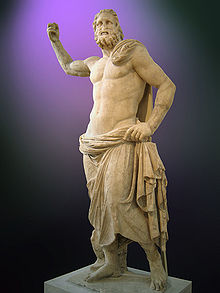Poseidon
| Poseidon | |
|---|---|
| God of the sea, earthquakes, storms, and horses | |

Poseidon from Milos, 2nd century BC (National Archaeological Museum of Athens)
|
|
| Abode | Mount Olympus, or the Sea |
| Symbol | Trident, fish, dolphin, horse and bull |
| Consort | Amphitrite |
| Parents | Cronus and Rhea |
| Siblings | Hades, Demeter, Hestia, Hera, Zeus, Chiron |
| Children | Theseus, Triton, Polyphemus, Belus, Agenor, Neleus, Atlas |
| Roman equivalent | Neptune |
Poseidon (/pəˈsaɪdən, pɒ-, poʊ-/;Greek: , pronounced [pose͜edɔ́͜ɔn]) was one of the twelve Olympian deities of the pantheon in Greek mythology. His main domain was the ocean, and he is called the "God of the Sea". Additionally, he is referred to as "Earth-Shaker" due to his role in causing earthquakes, and has been called the "tamer of horses". He is usually depicted as an older male with curly hair and a beard.
The name of the sea-god Nethuns in Etruscan was adopted in Latin for Neptune in Roman mythology; both were sea gods analogous to Poseidon. Linear B tablets show that Poseidon was venerated at Pylos and Thebes in pre-Olympian Bronze Age Greece as a chief deity, but he was integrated into the Olympian gods as the brother of Zeus and Hades. According to some folklore, he was saved by his mother Rhea, who concealed him among a flock of lambs and pretended to have given birth to a colt, which was devoured by Cronus.
...
Wikipedia
